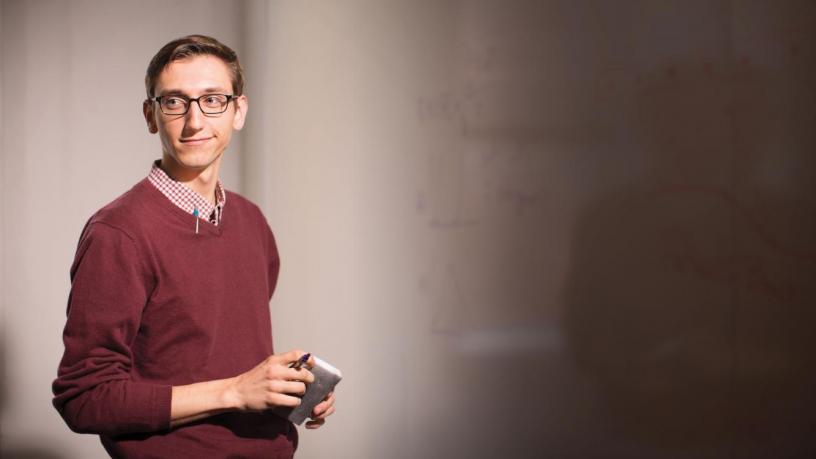Sidney Perkins | Biomedical Engineering | Senior
The spirit of engineering was ingrained early on in Sidney Perkins’s life. He has fond memories of rushing home from soccer practice to watch NOVA on PBS with his father, a mechanical engineer. His mother, a calculus tutor in her spare time, would teach him math concepts he hadn’t yet covered in class. Social responsibility, too, was intertwined in his community life, as Perkins devoted hours to volunteering in a way that proved formative.

Sidney Perkins (Photo by Eileen Barroso)
“I remember teaching swimming and sharing my love of the outdoors at a day camp for inner-city youth in the summer after my junior year. And I remember it was beyond gratifying.”
When considering which scientific discipline would provide him with the best vehicle for his altruism, Perkins decided on engineering as having the best potential to improve the world.
His quest to find an institution that embodied his values led him to the socially engaged community of SEAS, where he is currently a senior studying biomedical engineering. “The science of engineering is divorced from moral authority and constitutes the tools that we use to shape the world around us,” says Perkins. “This is technology: the ‘what’ of engineering. Equally, if not more, important is the art of engineering, which espouses serious ethical considerations for the implementation of engineering projects. This is the ‘where,’ ‘when,’ ‘how,’ and ‘why’ of engineering.” Perkins found this philosophy deeply rooted in the culture here.
He notes, “I saw a school that celebrates the importance of contextualized engineering: engineering for a purpose.”
For Perkins, nothing has more encapsulated this marriage of art and science than Columbia’s chapter of Engineers Without Borders, a group for which he has served as copresident, and which he describes as being a defining part of himself. He has gathered hands-on experience in design and leadership and, importantly, learned that, in engineering, the problem must always precede the solution.
His work with Engineers Without Borders continues to inform his experience: He took on field research this past August in Uganda, a trip facilitated by Senior Lecturer Aaron Kyle, for his senior design project. Before leaving, Perkins remarked he intends to conduct biomedical field research with a classmate and members of Neopenda—a startup by fellow Columbians aimed at providing neonatal care in low-resource settings. “The team is looking to identify 100 problems in the span of one week through extensive communication with clinicians, professors, and representatives of NGOs in-country,” says Perkins, describing what will ultimately become a senior design project with large potential for impact.
In the future, Perkins plans to practice as a physician and understands his engineering background will provide a robust toolbox for his aspirations to leave the world better than he found it.
Speaking about this, he says, “One of my biggest excitements about going into medicine with a background in engineering is that when I encounter inefficiencies in procedures, or needed medical devices, there is no reason that I could not fill those gaps. I’m particularly interested to see how this plays out in tissue engineering.”
As for his own contributions to altruistic achievement through science and technology, he intends to remain committed to keep questioning, challenging, and maintaining a problem-focused approach. As Perkins notes, “This is the engineer in me.”
